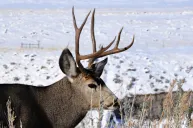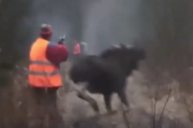A criminal court in Saskatchewan, Canada, convicted two brothers of moose poaching using video evidence posted to YouTube. According to Monday's announcement, the Melfort Provincial Court found David and Steven Ostapiw guilty of several wildlife offenses in May. The court also fined them $6,220 back.
Officials explained that a video of a moose hunt the brothers posted in 2022 tipped off the conservation officer who investigated the case. The brothers manage the channel Osta Cruiser, where they post videos mainly about off-road vehicles.
(The video that tipped off the conservation officer)
Moose hunting video leads to criminal investigation
Sgt. Ryan Reimer, the inspector of the conservation officer service, told CBC News that the investigating officer initially flagged one of the brothers not wearing legally required hunting colors.
"That key piece of evidence led the officer to kind of dig into who that individual was, if he held the appropriate licenses, and it turns out that in this case, he didn't," Reimer said.
He explained that the investigator's findings led officers to search David Ostapiw's house. There they found additional evidence, including a set of moose antlers from the animal taken in the video as well as electronic equipment and firearm used during the illegal hunt. "It was determined there was enough evidence to lay charges against the two individuals," Reimer added.
According to the announcement, David Ostapiw pleaded guilty to the bulk of the charges, including unlawful hunting, failure to wear hunting colors, and providing false information to an officer. Whereas his brother pleaded guilty to allowing another person to use his game seal and providing false information to an officer.
While social media can be a useful tool in police investigations, Reimer credits the investigating officer's interest in hunting and social media for a successful prosecution.
"We're hunters and fishers ourselves. A lot of time we will follow certain accounts and videos," Reimer said. "In this case, an officer's keen eye picked up a potential violation, which led to a subsequent lengthy investigation, and charges and fines as a result."




